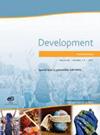开发中的过渡——对Jan Żylicz的采访。
IF 3.7
2区 生物学
Q1 DEVELOPMENTAL BIOLOGY
引用次数: 0
摘要
Jan Żylicz是丹麦哥本哈根大学诺和诺德基金会干细胞医学中心reNEW的副教授。Jan的工作跨越了表观遗传学,染色质和代谢领域,以了解干细胞和发育中基因表达的代谢调节。我们会见了Jan on Teams,了解了更多关于在国外工作的情况,找到了一位好的导师,以及他迄今为止的职业道路。本文章由计算机程序翻译,如有差异,请以英文原文为准。
Transitions in development - an interview with Jan Żylicz.
Jan Żylicz is an Associate Professor at the Novo Nordisk Foundation Center for Stem Cell Medicine, reNEW, within the University of Copenhagen, Denmark. Jan's work bridges the fields of epigenetics, chromatin and metabolism to understand the metabolic regulation of gene expression in stem cells and development. We met with Jan on Teams to learn more about working abroad, finding a good mentor and his career path so far.
求助全文
通过发布文献求助,成功后即可免费获取论文全文。
去求助
来源期刊

Development
生物-发育生物学
CiteScore
6.70
自引率
4.30%
发文量
433
审稿时长
3 months
期刊介绍:
Development’s scope covers all aspects of plant and animal development, including stem cell biology and regeneration. The single most important criterion for acceptance in Development is scientific excellence. Research papers (articles and reports) should therefore pose and test a significant hypothesis or address a significant question, and should provide novel perspectives that advance our understanding of development. We also encourage submission of papers that use computational methods or mathematical models to obtain significant new insights into developmental biology topics. Manuscripts that are descriptive in nature will be considered only when they lay important groundwork for a field and/or provide novel resources for understanding developmental processes of broad interest to the community.
Development includes a Techniques and Resources section for the publication of new methods, datasets, and other types of resources. Papers describing new techniques should include a proof-of-principle demonstration that the technique is valuable to the developmental biology community; they need not include in-depth follow-up analysis. The technique must be described in sufficient detail to be easily replicated by other investigators. Development will also consider protocol-type papers of exceptional interest to the community. We welcome submission of Resource papers, for example those reporting new databases, systems-level datasets, or genetic resources of major value to the developmental biology community. For all papers, the data or resource described must be made available to the community with minimal restrictions upon publication.
To aid navigability, Development has dedicated sections of the journal to stem cells & regeneration and to human development. The criteria for acceptance into these sections is identical to those outlined above. Authors and editors are encouraged to nominate appropriate manuscripts for inclusion in one of these sections.
 求助内容:
求助内容: 应助结果提醒方式:
应助结果提醒方式:


